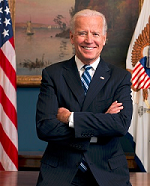 |
| Vice President Joe Biden |
Vice President Joe Biden used the spotlight at the World Economic Forum in Davos to gather together some of the top players in drug R&D and highlight his push to speed up the development and approval of new cancer drug combos. His message won the enthusiastic support of NIH chief Francis Collins and resonated with insiders at the FDA, a list that likely includes cancer drug czar Richard Pazdur, who's been playing a leading role in revamping the way cancer drugs are studied and approved for marketing over the past three years.
Biden told the crowd at Davos that he already had a commitment from the head of the FDA to accelerate the approval of new drug cocktails in oncology, a major focus for a wide variety of biotech and pharma companies currently engaged in cancer drug research. And some unidentified CEOs at a recent meeting in his home made clear they were "open" to a new way of doing business, Biden added, according to a report from Reuters.
Biden attended the panel discussion with some of the leading luminaries of the research world, including Charles Sawyers, a cancer drug researcher at Memorial Sloan Kettering who's made major breakthroughs on prostate cancer, and UC Berkeley's Jennifer Doudna, one of a handful of scientists credited with the basic research behind an explosion of new work being done with CRISPR/Cas9 gene editing tech.
But in some ways, Biden--tasked with overseeing the president's cancer "moonshots" program--is several years late to the kickoff of a new era in cancer drug R&D.
Nearly three years ago at the 2013 ASCO meeting Pazdur voiced his full-throated support of the new breakthrough drug designation at the FDA, committing to guiding the most promising new cancer drugs through a faster regulatory review process. And he kept that promise, noting a burst of 16 new cancer drug approvals last year--slightly more than a third of the 45 new treatments approved in 2015. Six were approved in November alone, with more than half accelerated by one of several expedited review processes at the agency.
"Over the years, oncology drugs have become 'targeted agents' aimed at specific molecular pathways or targets that are involved in cancer growth," Pazdur wrote in a blog post at the FDA. "These drugs have been developed because of a greater basic scientific understanding of how cancers grow. Examples of targeted agents approved in 2015 include Alecensa (alectinib) and Tagrisso (osimertinib) for the treatment of specific types of lung cancer as well as the approval of Cotellic (cobimetinib) for the treatment of metastatic melanoma. Drugs aimed at a specific molecular target generally have greater effectiveness in a specific population and may generally have a more favorable benefit-risk profile."
But Pazdur has also publicly acknowledged a personal motivation as well. His wife recently died of cancer and in an interview with the New York Times, Pazdur made it clear that her case factored into the makeover at the FDA, just as Biden has cited the death of his son from brain cancer as a reason for his commitment to the cause.
The change in cancer drug R&D over the years has been obvious to any careful observer. Developers are more likely to take a shot at an accelerated approval with Phase II data. And they're more likely to succeed. For patients making a last stand against cancer, the FDA has clearly been willing to go the extra mile to make new drugs available earlier than ever before.
That's made a big difference to pharma companies like Merck ($MRK) looking to new blockbuster cancer drugs like Keytruda to accelerate revenue while advocates demand early access for dying patients.
Evidently there's still more time that can be eliminated from the approval process.
- here's a link to the video from Davos